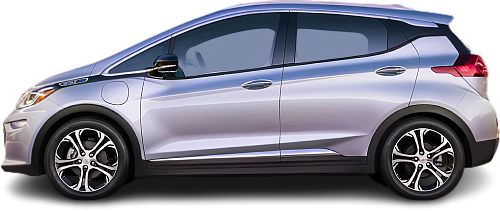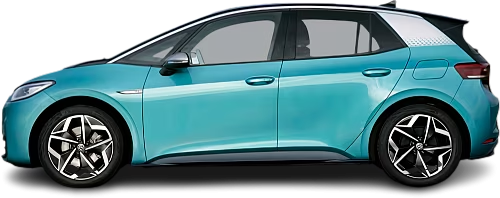USA EV Comparison: Chevrolet Bolt EV Gen 1 vs Volkswagen ID.3 Pro
Struggling to Decide? Let AI Help!
Your AI Summary Is Ready!
General Info
Since both vehicles have been discontinued, they are now only available on the used car market. You can get the Chevrolet Bolt EV Gen 1 (2017-2019) for as low as $6995, while the Volkswagen ID.3 Pro (2020-2023) was never offered for sale in the United States.
The two vehicles share the same body style: Hatchback.
| Property | Chevrolet Bolt EV Gen 1 | Volkswagen ID.3 Pro |
|---|---|---|
| Years of Production | 2017-2019 | 2020-2023 |
| Current Status | Discontinued | Discontinued |
| Country of Manufacture | USA | Germany, China |
| Body Style | Hatchback | Hatchback |
| Market Availability | USA | EU |
| Price USA (Used) | $6995 | - Price USA (Used) |
| GCC Score | 5.1 | 5.6 |
Range and Efficiency
While the Volkswagen ID.3 Pro (2020-2023) offers a longer real-world range and a bigger battery, it is less energy-efficient than the Chevrolet Bolt EV Gen 1 (2017-2019).
| Property | Chevrolet Bolt EV Gen 1 | Volkswagen ID.3 Pro |
|---|---|---|
| Range (EPA) | 238 mi | - Range (EPA) |
| Range (WLTP) | - Range (WLTP) | 264 mi |
| Range (GCC) | 226 mi | 228 mi |
| Battery Capacity (Nominal) | 60 kWh | 62 kWh |
| Battery Capacity (Usable) | 57 kWh | 58 kWh |
| Efficiency per 100 mi | 25.2 kWh/100 mi | 25.4 kWh/100 mi |
| Efficiency per kWh | 3.96 mi/kWh | 3.93 mi/kWh |
| Range and Efficiency Score | 7 | 7 |
Charging
Both vehicles utilize a standard 400-volt architecture.
The Volkswagen ID.3 Pro (2020-2023) offers faster charging speeds at DC stations, reaching up to 100 kW, while the Chevrolet Bolt EV Gen 1 (2017-2019) maxes out at 50 kW.
The Volkswagen ID.3 Pro (2020-2023) features a more powerful on-board charger, supporting a maximum AC charging power of 11 kW, whereas the Chevrolet Bolt EV Gen 1 (2017-2019) is limited to 7.2 kW.
| Property | Chevrolet Bolt EV Gen 1 | Volkswagen ID.3 Pro |
|---|---|---|
| Max Charging Power (AC) | 7.2 kW | 11 kW |
| Max Charging Power (DC) | 50 kW | 100 kW |
| Architecture | 400 V | 400 V |
| Charge Port | CCS Type 1 | CCS Type 2 |
| Charging Score | 4.3 | 5.6 |
Performance
The Volkswagen ID.3 Pro (2020-2023) is rear-wheel drive, while the Chevrolet Bolt EV Gen 1 (2017-2019) offers a front-wheel drive system.
The Chevrolet Bolt EV Gen 1 (2017-2019) boasts greater motor power and accelerates faster from 0 to 60 mph.
| Property | Chevrolet Bolt EV Gen 1 | Volkswagen ID.3 Pro |
|---|---|---|
| Drive Type | FWD | RWD |
| Motor Type | PMSM | PMSM |
| Motor Power (kW) | 150 kW | 107 kW |
| Motor Power (hp) | 201 hp | 143 hp |
| Motor Torque | 266 lb-ft | 203 lb-ft |
| 0-60 mph | 6.9 s | 9.3 s |
| Top Speed | 91 mph | 99 mph |
| Performance Score | 3.5 | 2.9 |
Dimensions
The Volkswagen ID.3 Pro (2020-2023) is longer and wider, but the Chevrolet Bolt EV Gen 1 (2017-2019) is taller.
The Volkswagen ID.3 Pro (2020-2023) boasts a more extended wheelbase.
| Property | Chevrolet Bolt EV Gen 1 | Volkswagen ID.3 Pro |
|---|---|---|
| Length | 164 in | 167.8 in |
| Width (with Mirrors) | 80.3 in | 81.5 in |
| Width (w/o Mirrors) | 69.5 in | 71.2 in |
| Height | 62.8 in | 61.1 in |
| Wheelbase | 102.4 in | 108.9 in |
Cargo and Towing
The Chevrolet Bolt EV Gen 1 (2017-2019) provides more cargo capacity, featuring both a larger trunk and more space with the rear seats folded.
Neither car is equipped with a frunk (front trunk).
Neither vehicle is officially rated for towing in the US.
| Property | Chevrolet Bolt EV Gen 1 | Volkswagen ID.3 Pro |
|---|---|---|
| Number of Seats | 5 | 5 |
| Curb Weight | 3580 lb | 3979 lb |
| Cargo Volume (Trunk) | 16.9 ft3 | 13.6 ft3 |
| Cargo Volume (Max) | 56.6 ft3 | 44.7 ft3 |
| Cargo Volume (Frunk) | - Cargo Volume (Frunk) | - Cargo Volume (Frunk) |
| Towing Capacity | - Towing Capacity | - Towing Capacity |
| Cargo and Towing Score | 4.7 | 4.3 |




